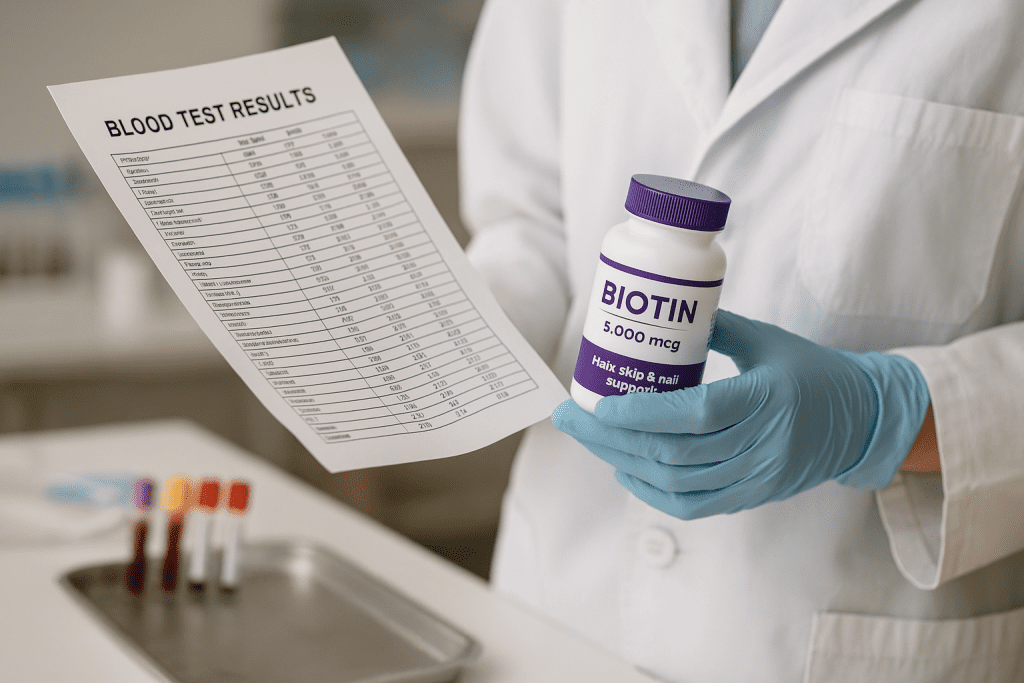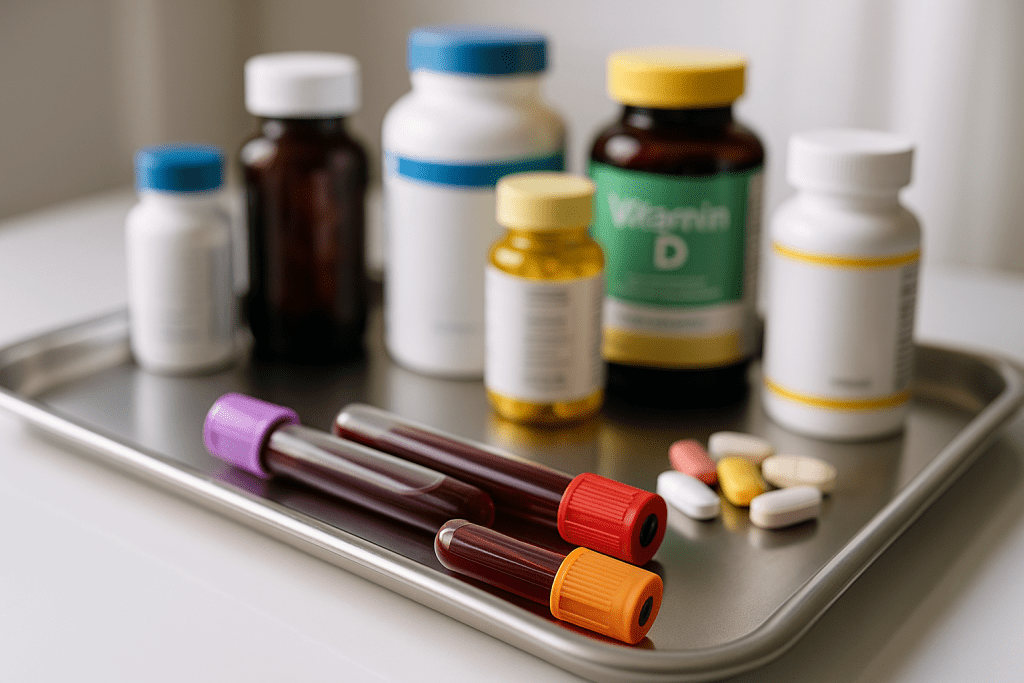Biotin, a popular supplement for hair and nail health, can quietly distort your lab test results — sometimes with life-altering consequences. From thyroid misdiagnoses to missed heart attacks, the risks of biotin lab test interference are real, especially for those taking medications.
This guide breaks down how biotin affects common tests, the science behind the disruption, who’s most at risk, and how to protect yourself from false lab results while managing medications.
Quick Summary: Does Biotin Cause False Lab Results?
Yes — biotin supplements can interfere with lab tests, especially those using biotin-streptavidin technology. This interference can result in false positives or negatives, which may mislead diagnoses.
| Aspect | Detail |
|---|---|
| Main Issue | Biotin disrupts immunoassay test designs |
| Tests Affected | Thyroid, cardiac (troponin), hormone, vitamin D, tumor markers |
| Doses of Concern | >5 mg/day, common in hair/nail supplements and MS therapies |
| False Result Types | TSH, Troponin: Falsely Low; T4, Cortisol: Falsely High |
| Safe Pause Before Test | 48–72 hours (up to 7 days for very high doses) |
| Solution | Disclose supplement use, pause biotin, request retesting if needed |

How Biotin Affects Lab Tests
The Science Behind Biotin Interference
Many modern immunoassays, used to analyze blood samples, rely on a biotin-streptavidin binding system. Biotin acts as a connector in the test’s structure. When high levels of supplemental biotin flood your bloodstream, they disrupt this mechanism, leading to false results. The direction of error — whether falsely high or low — depends on the test’s design.
As explained in this detailed St. James’s Hospital report, doses above 5 mg/day are particularly concerning, yet many over-the-counter beauty supplements exceed that amount.
Which Lab Tests Are Affected by Biotin?
Falsely Decreased Results
| Test Category | Specific Tests |
|---|---|
| Thyroid | TSH |
| Cardiac | Troponin T (used in heart attack diagnosis) |
| Hormonal | FSH, LH, βhCG, PTH, Aldosterone, Renin |
| Cancer Markers | PSA, CA-125 |
| Others | NT-proBNP (heart failure), IGF-1 |
A falsely low troponin result could hide a heart attack. Likewise, low TSH paired with elevated T4/T3 may mimic Graves’ disease — even if symptoms say otherwise.
Falsely Elevated Results
| Test Category | Specific Tests |
|---|---|
| Thyroid | Free T4, Total T4, T3 |
| Hormonal | Cortisol, Estradiol |
| Vitamin Levels | Vitamin D |
According to the American Thyroid Association, such discrepancies have led to widespread confusion and inappropriate treatments.
Sources and Doses of Concern
Biotin (also known as vitamin B7, vitamin H, or coenzyme R) is included in many products — not just those labeled “biotin.”
Biotin-Rich Supplements
| Supplement Type | Biotin Content (Approximate) |
|---|---|
| Hair/Nail Formulas | 5,000–10,000 mcg (5–10 mg) |
| B-Complex Vitamins | 30–300 mcg |
| Prenatal Vitamins | 30–35 mcg |
| High-Dose MS Therapy | 100–300 mg |
Supplements marketed for psoriasis, hair regrowth, or neurological conditions are most likely to contain high doses. A report from the FDA has warned that even routine supplements can skew results.
Who’s Most at Risk of False Results?
People who combine medications with regular lab testing face the greatest risk of biotin-induced inaccuracies.
Vulnerable Groups
- Thyroid patients on levothyroxine or methimazole
- Heart patients who monitor troponin or BNP
- People on hormone therapy (e.g., fertility treatment)
- Vitamin D users who track blood levels
- Cancer patients under surveillance
- Pregnant individuals using prenatal vitamins
In critical settings like emergency rooms, the presence of biotin in the blood could make the difference between rapid intervention and missed diagnosis.

How to Prevent Biotin Lab Test Interference
Best Practices Before Testing
| Situation | Recommended Biotin Pause |
|---|---|
| Standard Dose (<5 mg/day) | Stop 2–3 days before testing |
| High Dose (5–10 mg/day) | Stop at least 72 hours before test |
| Mega Dose (>10 mg/day or MS use) | Discontinue for 5–7 days |
These recommendations are supported by clinical findings published in PMC.
Tips for Safer Testing
- Always inform your doctor and lab technician about biotin use
- Bring your supplement list to appointments
- Request alternative assays if biotin cannot be discontinued
- Ask for a retest if lab values don’t match how you feel
More guidance is available through Testing.com, which offers patient-friendly resources.
Real-Life Examples of Biotin-Driven Misdiagnosis
Case 1: Thyroid Confusion
A 23-year-old woman developed symptoms resembling hyperthyroidism. After multiple abnormal thyroid labs, she was nearly started on treatment for Graves’ disease — until doctors realized she had been taking 20 mg of biotin daily for hair loss.
Case 2: Unexpected Hormone Levels
A 19-year-old taking 20 mg biotin for beauty reasons received elevated free T4 and low TSH readings, prompting concern about her thyroid function. The issue resolved after stopping biotin.
Case 3: Contradictory Symptoms
A 45-year-old man using 30 mg biotin for psoriasis-related nail changes showed hyperthyroid labs while feeling hypothyroid. Only after discontinuing biotin did his results align with his symptoms.
These cautionary tales highlight why it’s critical to consider supplements before jumping to conclusions about lab abnormalities. You can read more about these stories in this case series.
Do Other Medications Cause False Lab Results Too?
Yes. According to this comprehensive PMC review, drug-laboratory test interactions (DLTIs) affect up to 43% of patients undergoing lab work. These fall into:
1. Analytical Interference
Drugs interfere with the testing process itself.
2. Physiological Interference
Drugs alter the body’s biochemistry, changing what the test is measuring.
Notable Examples
| Drug/Class | Interference |
|---|---|
| Cephalosporins | False ↑ creatinine (Jaffe method) |
| Fluoroquinolones | Disrupt glucose metabolism |
| Acetaminophen | False ↑ glucose on monitors |
| Vitamin C | False ↓ cholesterol, bilirubin, etc. |
| Proton Pump Inhibitors | Elevate chromogranin A (tumor marker) |
| Statins | Can raise fasting glucose levels |
For a more complete list, Medscape and Beaumont Hospital offer curated references.
Conclusion
Biotin supplement confusion is more than a quirky lab fluke — it’s a legitimate health risk. If you’re taking biotin for beauty, pregnancy, or a medical condition, and also undergoing lab tests, be proactive:
- Pause biotin for 2–7 days based on dose
- Tell every provider about your supplement use
- Ask for a retest if results don’t align with symptoms
These steps can prevent false lab results, unnecessary treatments, and missed diagnoses. To stay informed about safe supplement use, explore more guides here on UsefulVitamins.com.

